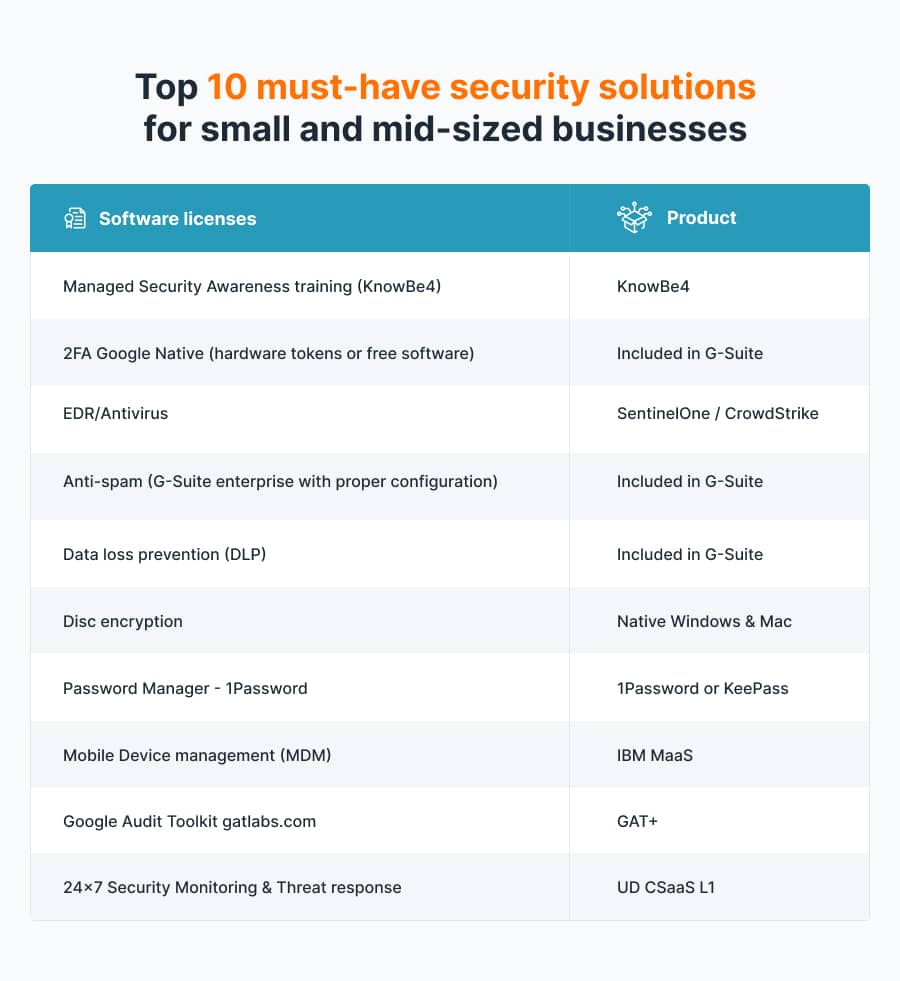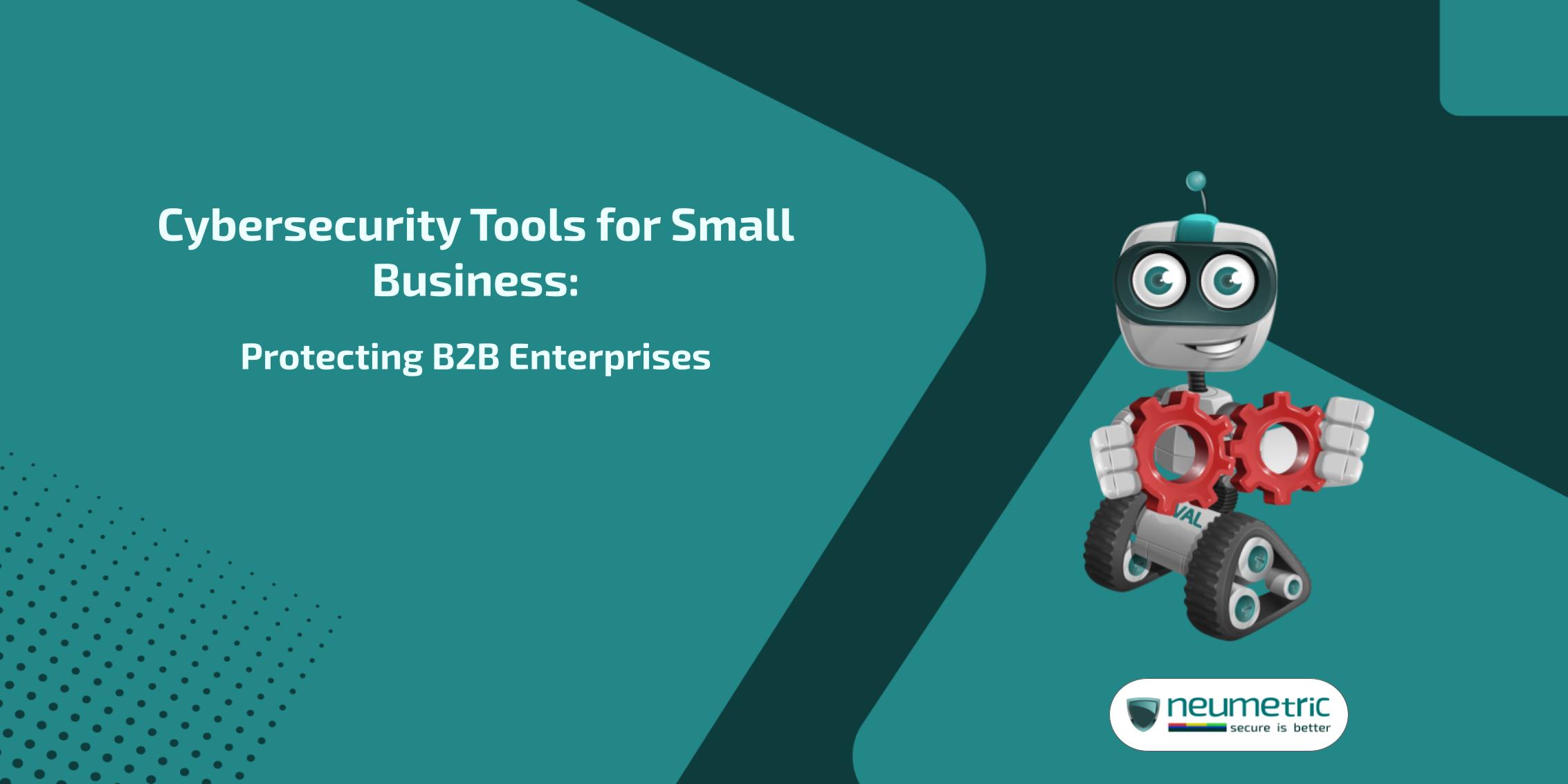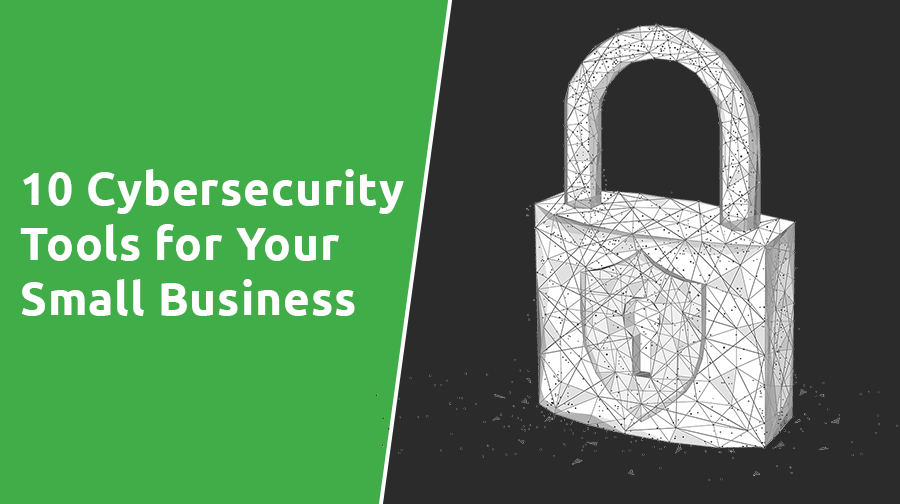In today’s digital age, small businesses face growing cyber threats. Protecting sensitive data is vital.
Cybersecurity tools help small businesses safeguard their information. They prevent data breaches, malware, and other cyber attacks. Investing in the right tools can save your business from costly damage. Small businesses are often easy targets due to limited resources. That’s why having the right cybersecurity tools is crucial.
These tools help secure networks, protect sensitive data, and ensure business continuity. With the right protection, you can focus on growing your business without fear. Let’s explore the best cybersecurity tools to keep your small business safe and secure.

Credit: it.nc.gov
Importance Of Cybersecurity
In today’s digital world, the importance of cybersecurity cannot be overstated, especially for small businesses. While large corporations often have dedicated IT teams to fend off cyber threats, small businesses are frequently left vulnerable. This makes understanding and implementing cybersecurity tools not just a good idea, but a necessity for survival.
Risks For Small Businesses
Small businesses face a unique set of risks when it comes to cybersecurity. Often, they are seen as easy targets by cybercriminals because they may lack sophisticated security measures. Here are some common risks:
- Phishing Attacks: Cybercriminals use deceptive emails to trick employees into providing sensitive information.
- Ransomware: Malicious software that locks business data until a ransom is paid.
- Data Breaches: Unauthorized access to sensitive customer or business information.
- Insider Threats: Employees or former employees who misuse their access to company data.
Imagine waking up to find your business’s data held hostage. Not fun, right? That’s why understanding these risks is crucial.
Benefits Of Strong Cybersecurity
Now, let’s talk about the bright side – the benefits of having strong cybersecurity measures in place. They go beyond just protecting data; they safeguard your entire business operation.
- Protects Business Reputation: Customers trust businesses that protect their data. A breach can damage that trust.
- Prevents Financial Loss: Cyberattacks can be costly. Strong security saves money in the long run.
- Ensures Business Continuity: With proper measures, your business can continue to operate smoothly, even if an attack occurs.
- Compliance with Regulations: Many industries have legal requirements for data protection. Strong cybersecurity helps you stay compliant.
Think of cybersecurity as a sturdy lock on your digital doors. It keeps the bad guys out and your business running smoothly.
In conclusion, while the digital landscape offers immense opportunities for small businesses, it also comes with its share of threats. Understanding the importance of cybersecurity and implementing the right tools can make all the difference. After all, a stitch in time saves nine, right?
Antivirus Software
When it comes to protecting your small business from cyber threats, antivirus software is one of the most essential tools you can have. This software acts as your first line of defense against a wide range of malicious attacks, including viruses, malware, and spyware. But how do you choose the best antivirus solution for your needs? Let’s break it down.
Top Antivirus Options
Choosing the right antivirus software can be daunting, given the plethora of options available. Here are some top contenders that are both effective and user-friendly:
- Norton Antivirus: Renowned for its comprehensive protection and user-friendly interface.
- Bitdefender: Offers excellent real-time protection and is known for its low impact on system performance.
- McAfee: Provides robust security features and is particularly good at detecting and removing malware.
- Avast: Free for basic use, with a premium version that offers advanced features.
- Kaspersky: Highly rated for its effectiveness in detecting and neutralizing threats.
Features To Look For
Not all antivirus software is created equal. Here are some key features you should look for to ensure you get the best protection for your small business:
- Real-time Scanning: Ensures continuous protection by scanning files and applications as they are accessed or downloaded.
- Automatic Updates: Keeps the software up-to-date with the latest virus definitions to protect against new threats.
- Firewall: Adds an extra layer of security by monitoring incoming and outgoing network traffic.
- Multi-Device Protection: Ideal if your business uses multiple devices like PCs, smartphones, and tablets.
- User-Friendly Interface: Makes it easy for non-tech-savvy users to manage and understand.
With the right antivirus software, you can significantly reduce the risk of cyber threats and keep your business data secure. So, which one will you choose to fortify your digital fortress?
Firewalls
Firewalls are essential cybersecurity tools for small businesses. They act as barriers between trusted internal networks and untrusted external ones. Firewalls monitor incoming and outgoing network traffic based on security rules. They block unauthorized access while permitting authorized communication. This protection is crucial for safeguarding sensitive data and maintaining the integrity of business operations.
Types Of Firewalls
Firewalls come in different types, each offering unique features. Packet-filtering firewalls inspect packets of data and allow or block them based on predefined rules. They are basic but effective for small networks.
Stateful inspection firewalls monitor active connections and make decisions based on the state of the traffic. They offer more security than packet-filtering firewalls.
Proxy firewalls act as intermediaries between users and the internet. They hide the internal network’s identity and filter requests. This type provides a high level of security.
Next-generation firewalls (NGFW) combine traditional firewall functions with advanced features. These include intrusion prevention systems (IPS) and deep packet inspection. NGFWs offer comprehensive protection against modern threats.
Setting Up A Firewall
Setting up a firewall involves several key steps. First, determine the network’s security needs. Identify the types of data you need to protect. This will help in selecting the right type of firewall.
Next, install the firewall hardware or software. Follow the manufacturer’s instructions carefully. Configure the firewall settings to match your security requirements. Define security rules to control traffic. Allow only necessary connections and block all other traffic.
Regularly update the firewall software. Security threats evolve, so updates are crucial. Test the firewall to ensure it is working correctly. Conduct periodic reviews and adjust the settings as needed.
Training employees about firewall importance is also essential. They should know how to report suspicious activity. This helps in maintaining a secure network environment.

Credit: underdefense.com
Encryption Tools
When it comes to protecting sensitive data, encryption tools are essential for small businesses. These tools help ensure that even if your data falls into the wrong hands, it remains unreadable and secure. In this section, we will delve into why encryption matters and explore some popular encryption tools that can fortify your business’s cybersecurity framework.
Why Encryption Matters
Encryption is a process that converts data into a code to prevent unauthorized access. In a world where cyber threats are constantly evolving, encrypting your data is like locking it in a safe. It ensures that only those with the correct key can access the information. For small businesses, this is particularly crucial as they often have limited resources to recover from data breaches.
Consider this: You have a customer database that includes personal details, payment information, and order histories. If a hacker gets hold of this data, it could lead to identity theft, financial loss, and a damaged reputation. Encrypting this data keeps it safe and helps you comply with data protection regulations, such as GDPR and HIPAA.
Popular Encryption Tools
There are several encryption tools available that can help safeguard your data. Here are some popular ones to consider:
- VeraCrypt: This free, open-source tool allows you to create encrypted volumes within your hard drive. It’s user-friendly and provides robust security features.
- BitLocker: Available on Windows, BitLocker encrypts your entire drive. It’s integrated into the OS, making it easy to use without needing additional software.
- AxCrypt: Ideal for small businesses, AxCrypt offers strong encryption for individual files. It’s simple to use and integrates well with Windows.
- NordLocker: From the makers of NordVPN, this tool offers end-to-end encryption for your files, ensuring they are secure whether stored locally or in the cloud.
Each of these tools has its strengths, so it’s worth evaluating your specific needs to choose the best fit for your business. Remember, the goal is to make your data as secure as possible while maintaining ease of access for authorized users.
In conclusion, encryption tools are a vital component of any small business’s cybersecurity strategy. By understanding why encryption matters and selecting the right tools, you can significantly enhance your data protection efforts, ensuring your business remains secure in an increasingly digital world.
Password Managers
When it comes to cybersecurity for small businesses, one of the simplest yet most effective tools is a password manager. These handy tools can save you from the headache of remembering countless complex passwords and keep your online accounts safe from hackers. Not only do they store your passwords securely, but they also help you generate strong, unique passwords for each of your accounts. Let’s dive into how to choose the right password manager for your business and some best practices for using passwords effectively.
Choosing A Password Manager
Selecting a password manager might seem daunting, but it doesn’t have to be. Here are some key factors to consider:
- Security Features: Ensure the password manager uses strong encryption methods. Look for features like two-factor authentication (2FA) and secure password sharing.
- Usability: The tool should be easy to use for you and your employees. A complicated interface can lead to poor adoption.
- Cross-Platform Compatibility: Make sure the password manager works on all the devices your team uses, including smartphones, tablets, and desktops.
- Cost: Budget is always a concern for small businesses. While some password managers are free, premium versions offer additional features that might be worth the investment.
For example, I’ve been using LastPass in my business for years. It’s user-friendly and offers a free version, which was a great starting point for us. As we grew, we upgraded to the premium version for added features and security.
Best Practices For Passwords
Even with a password manager, there are best practices to follow to ensure maximum security:
- Use Unique Passwords: Never reuse passwords across different accounts. A breach on one account shouldn’t compromise others.
- Generate Strong Passwords: Passwords should be long and complex, including a mix of letters, numbers, and symbols. Avoid using easily guessable information like birthdays or common words.
- Enable Two-Factor Authentication: Whenever possible, enable 2FA for an added layer of security. It’s like having a bouncer for your online accounts.
- Regularly Update Passwords: Change your passwords regularly. Set reminders to update them every few months.
Remember the time I used “password123” for my email account? It was a disaster waiting to happen. Thankfully, I switched to a password manager and created a much stronger password, saving myself from potential breaches.
By following these guidelines and using a reliable password manager, you can significantly enhance your small business’s cybersecurity. It’s a small step that can make a big difference in protecting your valuable data.
Vpns
In today’s digital age, cybersecurity isn’t just for large corporations. Small businesses face threats too. One essential tool to protect your business is a VPN, or Virtual Private Network. But what exactly is a VPN, and how can it help your small business? Let’s dive into the details.
Benefits Of Using A Vpn
Using a VPN comes with several advantages, especially for small businesses looking to secure their online activities. Here are some key benefits:
- Enhanced Security: A VPN encrypts your internet connection, making it difficult for hackers to access your data.
- Remote Access: Employees can securely access the company network from anywhere, which is great for remote work.
- Privacy Protection: A VPN hides your IP address, ensuring your online activities remain private.
- Cost-Effective: Many VPN services are affordable, providing robust security without breaking the bank.
Imagine this: You’re at a café, sipping coffee and using the public Wi-Fi to check business emails. Without a VPN, this could be risky. But with a VPN, your connection is secure, and your data is safe from prying eyes.
Top Vpn Services
Choosing the right VPN service can be overwhelming with so many options available. Here are some of the top VPN services that are reliable, user-friendly, and perfect for small businesses:
- NordVPN: Known for its strong security features and fast speeds. NordVPN offers a user-friendly interface and 24/7 customer support.
- ExpressVPN: Offers high-speed servers across the globe, excellent encryption, and a no-log policy to ensure your privacy.
- Surfshark: Affordable and packed with features like unlimited device connections and ad-blocking capabilities.
- CyberGhost: User-friendly with dedicated servers for streaming and torrenting. It also provides robust security features.
- Private Internet Access (PIA): Offers strong encryption, a no-log policy, and a large network of servers at a competitive price.
Each of these services brings something unique to the table. Whether you prioritize speed, security, or budget-friendliness, there’s a VPN out there for you.
In conclusion, a VPN is more than just a tool; it’s a guardian of your online presence. By choosing the right VPN, you can ensure that your small business stays secure and your data remains private, no matter where you are. So, why wait? Strengthen your cybersecurity today with a reliable VPN service.
Phishing Protection
Phishing protection is crucial for small businesses. Phishing scams trick employees into revealing sensitive information. These scams often look like legitimate emails or websites. Protecting your business from phishing can save time, money, and data.
Identifying Phishing Scams
Phishing scams can be hard to spot. They often mimic real emails from trusted sources. Look for signs like poor grammar and urgent requests. Strange URLs are also a red flag. Teach employees to hover over links to see the real URL. Suspicious attachments or links should be avoided.
Tools To Prevent Phishing
Many tools help prevent phishing attacks. Email filters can block suspicious emails. Anti-phishing software can detect and stop phishing attempts. Web filters can prevent access to malicious websites. Training programs teach employees how to recognize phishing scams. Multi-factor authentication adds an extra layer of security.
Regular Updates And Patches
In the digital age, cybersecurity is crucial for small businesses. One key aspect of maintaining security is regular updates and patches. These updates ensure that your systems and software are protected against the latest threats. Ignoring updates can leave your business vulnerable to attacks.
Importance Of Updates
Updates fix security flaws in software. Hackers exploit these flaws to gain access to systems. Regular updates close these security gaps. They also improve the performance of your software. Think of updates as a shield for your business. Without them, your defenses are weak.
Automating Updates
Automating updates saves time and ensures consistency. Small businesses often lack dedicated IT staff. Automated systems handle updates without human intervention. This reduces the risk of missing important patches. Set up automatic updates for all software and systems.
Many software providers offer automatic update features. Enable these features to keep your software current. Automation tools can also schedule updates during non-business hours. This ensures minimal disruption to your daily operations.

Credit: www.neumetric.com
Frequently Asked Questions
What Is The Cybersecurity Toolkit For Small Business?
The cybersecurity toolkit for small businesses includes antivirus software, firewalls, secure passwords, regular updates, and employee training.
How Do I Set Up Cyber Security For My Small Business?
Set up a firewall, use strong passwords, enable two-factor authentication, regularly update software, and train employees on cyber security.
What Are The 5 C’s Of Cyber Security?
The 5 C’s of cyber security are Change, Compliance, Cost, Continuity, and Coverage. These aspects ensure robust protection against cyber threats.
Do Small Businesses Use Crowdstrike?
Yes, small businesses use CrowdStrike. It offers affordable, scalable cybersecurity solutions tailored for small to medium-sized enterprises.
Conclusion
Choosing the right cybersecurity tools is essential for small businesses. Protecting sensitive data keeps your business safe. Reliable tools can prevent cyber threats. Invest in good antivirus software. Use strong firewalls and encryption. Regularly update all your systems. Train employees on security practices.
Backup data frequently. Staying vigilant helps avoid cyber attacks. A secure business environment builds trust. Keep your business protected with these simple steps.

